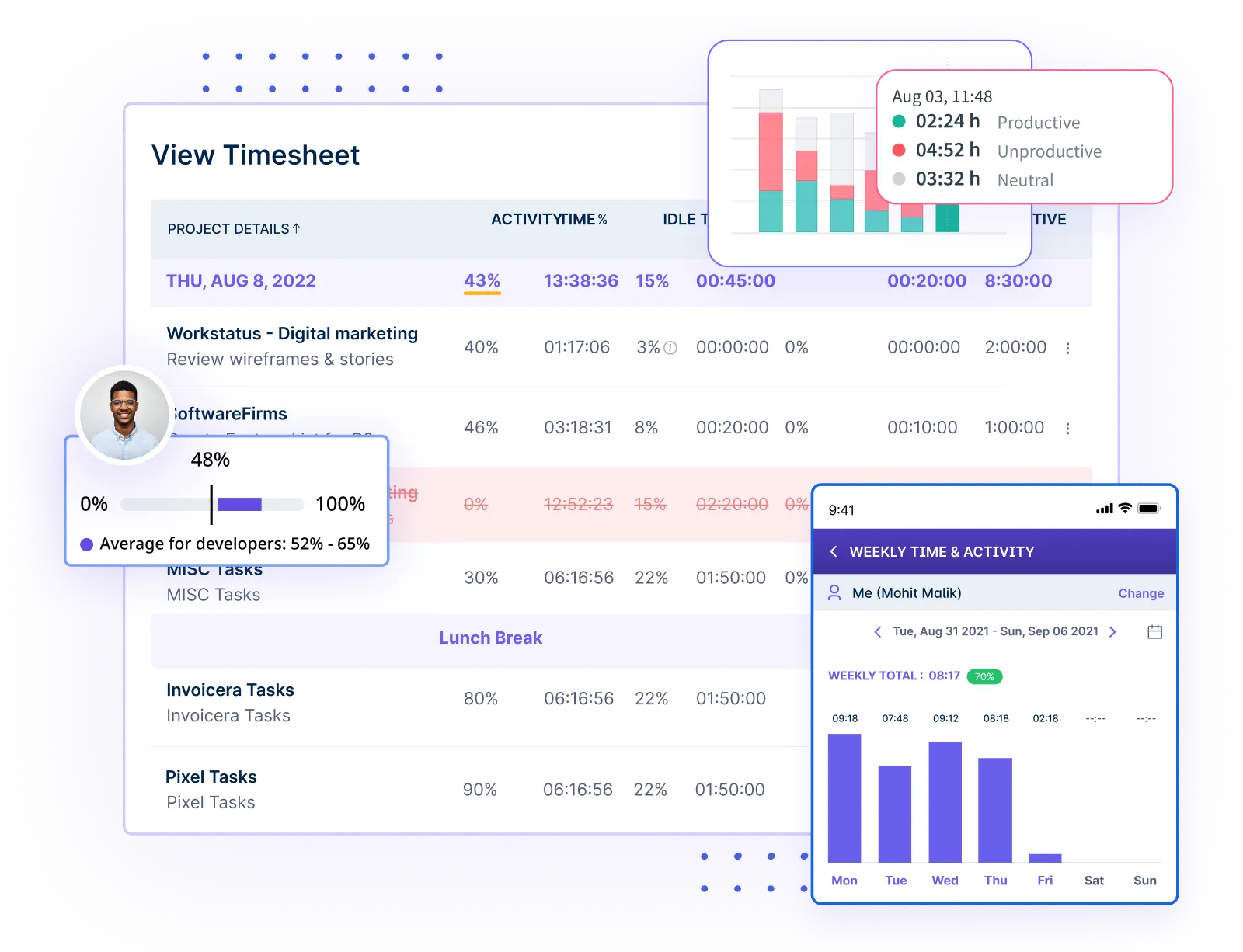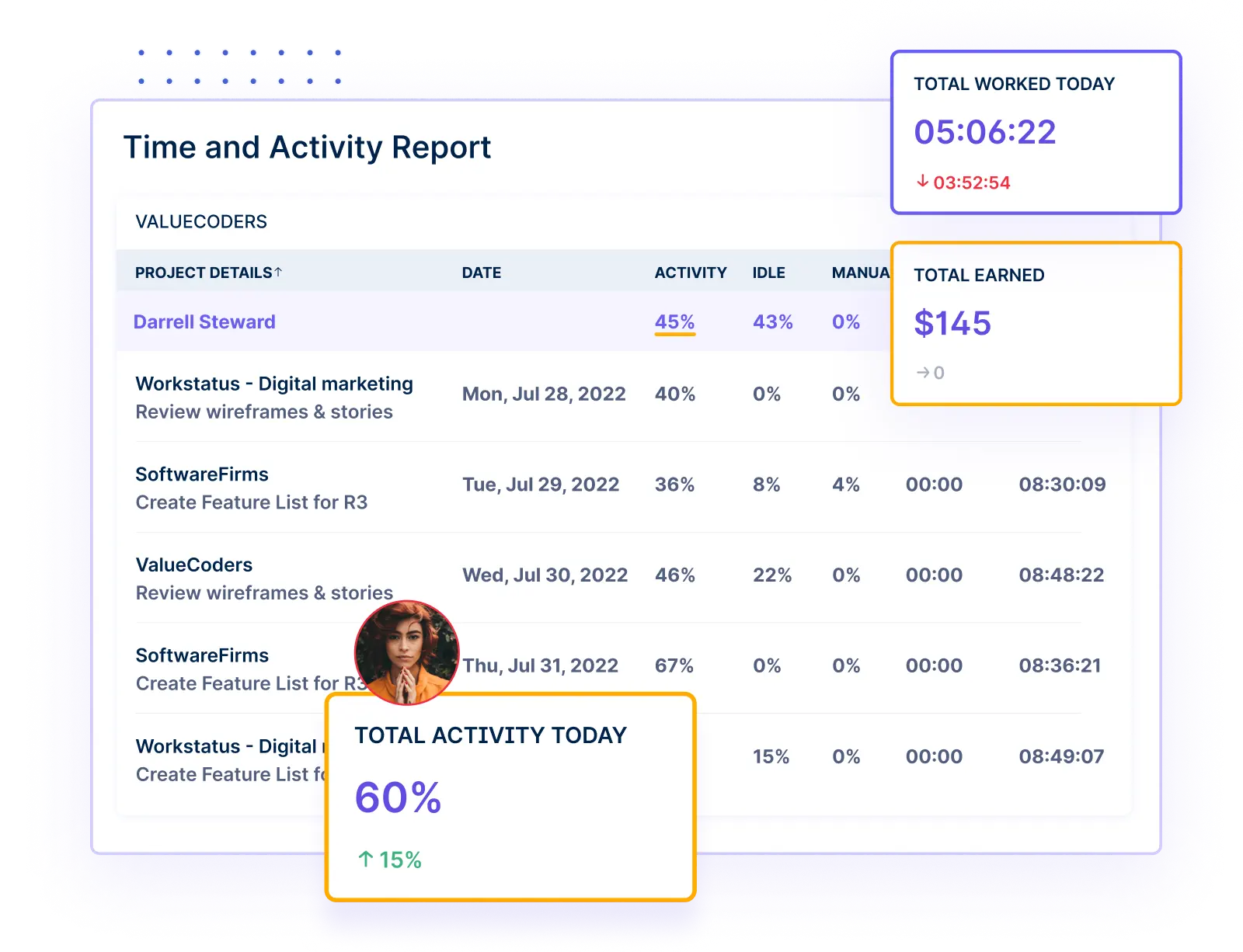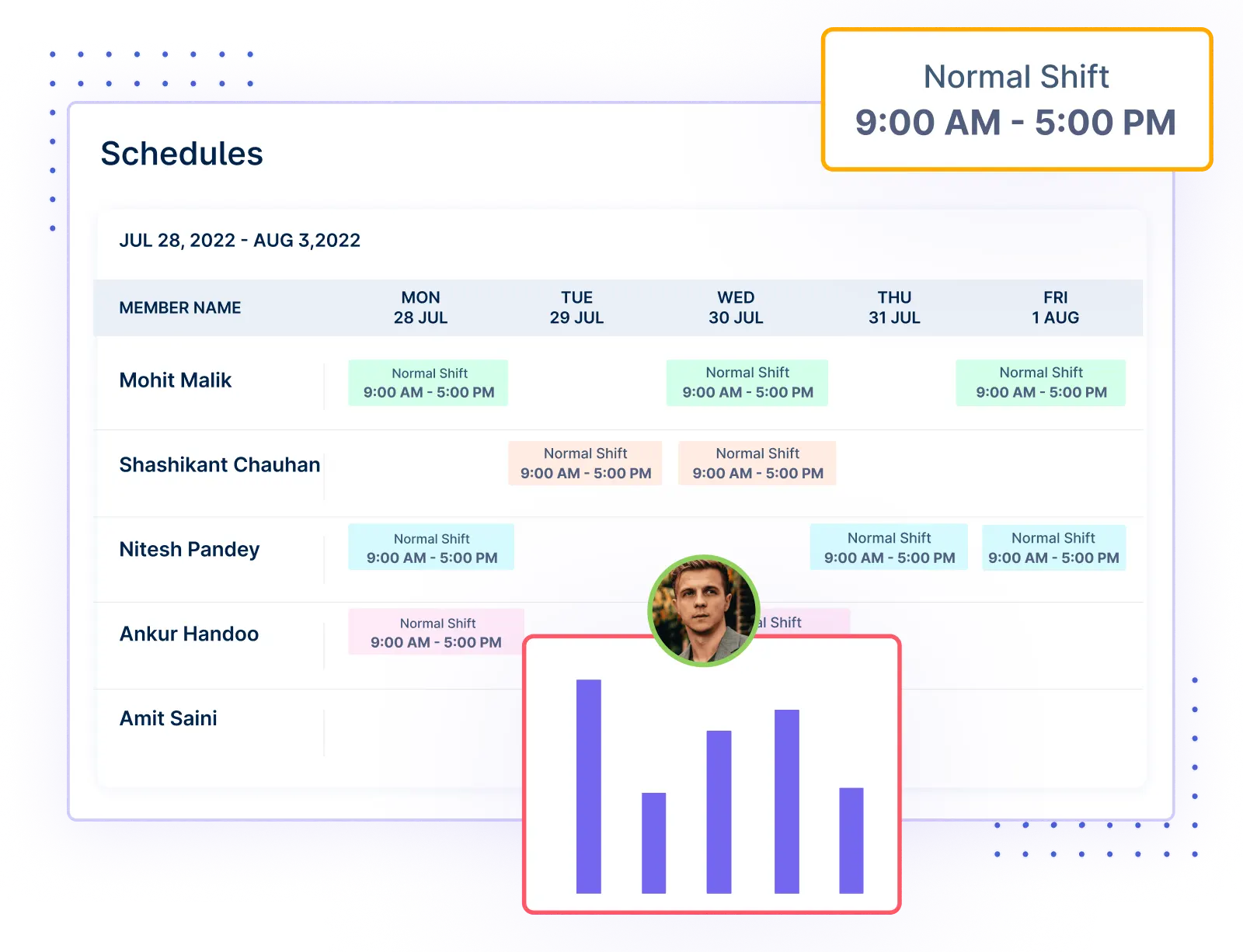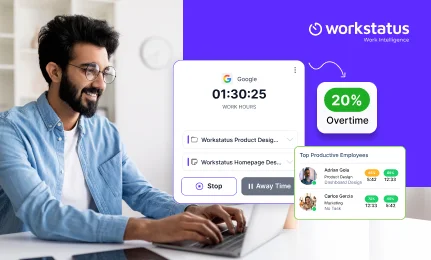Table of Contents
Time is one of a small business’s best resources, especially in its initial stages of operation.
Nonetheless, it is pretty easy to lose track of time during the day responding to emergencies, handling multiple tasks at once, or leading a growing team.
Time tracking has psychological effects that can help you change your business outlook. It helps relieve stress since it gives you an understanding of how much time you spend on each activity. This allows you to allocate your time effectively and avoid the dread of feeling swamped.
That is precisely where time tracking comes in.
Experts anticipate a strong annual growth rate of approximately 12% over the next five years, fueled by advancements in cloud solutions, mobile accessibility, and seamless integration with other productivity tools.
In this blog post, we will examine how time tracking for small businesses isn’t just a tool but a strategy for success. It helps reduce operational inefficiency and increase small business productivity, resulting in a proper work-life balance.
How Not Tracking Time Hinders Productivity?
Managing a business without time tracking is like driving a car without a map; you know you’re moving but not headed in the right direction and might overlook some crucial exits.
Let’s dive into some of the challenges you might face when you skip out on time tracking for small businesses:
Inefficient Resource Allocation
So, without time tracking, it becomes nearly impossible to determine where your resources – your team’s time or your own – are going.
It means that you can get locked into certain activities and neglect others or become obsessed with activities that are not effective at all. Specifically, time tracking gives the same idea about what occurs daily, enabling you to direct your resources effectively.
Low Employee Productivity
Under such conditions, employees can get trapped into working on other unnecessary tasks or just spend a lot of time idling. Of course, everybody is occupied with one thing or another nowadays, but how efficient are they?
With time management for small businesses, the employee can see where the time goes, and the manager can see improvements needed in staff productivity. It helps everyone stay on track and avoid getting stuck in things that are not productive and make progress slow.
Missed Deadlines and Poor Project Management
There will be chaos if no system is set to deal with due dates. There are no options for monitoring the time spent on each task so that you may deliver only half-finished and delayed assignments daily.
Keeping tabs on time enables the accomplishment of the task as assigned in time and with the most clear completion measures.
Inaccurate Billing and Invoicing
In a service-based business, the most effective way is to keep track of the time so that you can invoice. Without it, you may likely underprice your services or, the other way around, overprice your services because you never dated your time on a given client’s project.
With time management for small businesses, you ensure that each minute is charged and the invoices are clean and clear, helping you balance your cash flow and create happy clients.
Lack of Accountability and Transparency
When time is not recorded, it becomes relatively easy for workers, including entrepreneurs, to procrastinate or even assume their contribution is not appreciated. Once again, nobody can tell who is doing what or how many hours are spent on a particular task or duties.
Time tracking promotes discipline by implementing a culture of accountability. It is crucial to identify who does what and where there is a lack of performance or area for development. It’s like having a guide whispering into everyone’s ear, telling them to work to the best of their abilities.
In summary, if your business does not track time, it is like driving a car with a blindfold. However, establishing time management for small businesses makes you organized, focused, and confident.
Benefits of Time Tracking for Small Business
![]()
Whether it’s managing resources, improving accountability, or making smarter business decisions, time tracking is a key component in building a thriving business.
Check out the following benefits of time tracking for small businesses:
Improved Resource Distribution
Time tracking provides a good picture of when and where your personnel and money are being used. This saves resources and allows you to concentrate more on priorities such as essential tasks and projects.
- Defines where further attention and effort are required to optimize time
- Avoids time wastage by identifying areas of inefficiency
- Strives for improving small business efficiency
Boosted Employee Productivity
Time tracking makes employees conscious of their work and will help them reduce procrastination. It can also promote less interruption and better emphasis on critical work-related projects.
- Motivates workers and minimizes wastage of time
- Gives a framework to focus on high-priority tasks
- Helps identify potential productivity problems and provides support
Clearer Project and Task Deadlines
Setting a task’s duration helps create more accurate working schedules and assures that the job will be done within the time frame set. If workers do not track their work in that way, large projects can be more daunting, and deadlines can easily be missed.
- Offers realistic deadlines
- Avoids schedule overlap
- Enhances project execution
Accurate Billing and Invoicing
Time tracking ensures that time spent is valuable and not taken for granted. It also helps charge the correct prices, reducing the chances of overcharging or undercharging customers and improving customer relations and cash flow.
- Accurately tracking the billable hours minimizes errors
- Transparency of service tariffs fosters trust
- Distribute fairly the hours or efforts used on projects
Enhanced Accountability and Transparency
Tracking time brings a lot of discipline to the project because it shows who is working on what and how long it will take them to complete the work. It ensures that everyone is well informed of what is expected of them and by what time.
- Sets accountability values within the organization
- Enables checking the activity level and potential problems
- Helps set realistic goals & deadlines
Better Decision-Making and Business Insights
With detailed time-tracking data, you can spot inefficiencies and patterns, helping you make informed decisions that can improve small business productivity. This insight can also help you adjust strategies to better meet business goals.
- Provides data to spot inefficiencies and areas for improvement
- Helps make informed decisions about resource allocation
- Provides insights to improve business operations
Improved Work-Life Balance
Time tracking for small businesses ensures that workloads are manageable and prevents overworking, essential for maintaining a healthy work-life balance. It also helps identify when team members are burning out, allowing you to adjust workloads and promote well-being.
- Helps prevent burnout
- Helps in balancing employee workload
- Promotes a healthier work environment
Implementing IT companies time tracking software helps to optimize operations, enhance productivity, and ultimately achieve long-term success.
Types of Time Tracking
Here are common types of time tracking:
Automated Time Tracking
Automated time tracking tools automatically record time spent on tasks and projects. This method provides accuracy and efficiency with minimal human input. The software tracks time by running in the background while employees work.
- Allows for seamless tracking of time across tasks
- Helps businesses track billable hours
- Simplifies resource allocation for projects
Timesheet-Based Time Tracking
Timesheet-based time tracking typically involves filling out digital or paper timesheets where employees manually enter their work hours. This method is often used in businesses that need weekly or biweekly time-tracking reports.
- Offers a structured format to record work hours
- Suitable for businesses with part-timers/freelancers
- Timesheet data is stored on the cloud
How Workstatus Helps Small Businesses Accurate Time Tracking?
Workstatus is optimum technology software that tracks time and manages a competent workforce to enhance small business productivity. It is intuitive and has impressive features such as auto-generated timesheets, real-time tracking for small businesses, and other reports for any business type.
Here are the key features:
Online Timesheets
 As the free online timesheet software, Workstatus makes it easier to monitor working hours. While employees clock in their working hours in real-time or set them up at their discretion, managers receive a neatly sorted list of their subordinates’ performance. Calculations are automatic, and the system ensures that payrolls and clients’ billing are correct.
As the free online timesheet software, Workstatus makes it easier to monitor working hours. While employees clock in their working hours in real-time or set them up at their discretion, managers receive a neatly sorted list of their subordinates’ performance. Calculations are automatic, and the system ensures that payrolls and clients’ billing are correct.
Online Time Reporting
 Enable detailed reports to understand how time is utilized with time sheets. Workstatus reports employee productivity, completed work, and project progress per employee and as a team. These reports help in decision-making and can optimize the means and efforts of an organization.
Enable detailed reports to understand how time is utilized with time sheets. Workstatus reports employee productivity, completed work, and project progress per employee and as a team. These reports help in decision-making and can optimize the means and efforts of an organization.
Web-Based Time Tracker
![]() Track time without difficulties using Workstatus’s web-based time tracker. Employees can also sign in and sign out with just a click, and managers can track and oversee the employees’ performance and productivity. They can also maintain accountability without needing any further downloads.
Track time without difficulties using Workstatus’s web-based time tracker. Employees can also sign in and sign out with just a click, and managers can track and oversee the employees’ performance and productivity. They can also maintain accountability without needing any further downloads.
Shift Management
 Workstatus is beneficial for easy and effective employee shift management. It enables employees to design and manage shifts effectively and work in real-time without the risk of an unworkable schedule. It also enables employees to have schedules as often as possible while planning shifts efficiently and precisely.
Workstatus is beneficial for easy and effective employee shift management. It enables employees to design and manage shifts effectively and work in real-time without the risk of an unworkable schedule. It also enables employees to have schedules as often as possible while planning shifts efficiently and precisely.
Live Location Tracking
![]() Live location tracking enables you to view, in real-time, the location of field workers to track accountability for on-site and off-site assignments. This feature is designed for business organizations with operational mobile workers.
Live location tracking enables you to view, in real-time, the location of field workers to track accountability for on-site and off-site assignments. This feature is designed for business organizations with operational mobile workers.
Geofence Time Tracking
![]() Increase employee time tracking effectiveness with geofence time tracking for accuracy and accountability. Lay down certain areas as parameters, and Workstatus will record employees’ working time once they cross those areas or exit. This feature also benefits organizations that have tasks particular to a given region.
Increase employee time tracking effectiveness with geofence time tracking for accuracy and accountability. Lay down certain areas as parameters, and Workstatus will record employees’ working time once they cross those areas or exit. This feature also benefits organizations that have tasks particular to a given region.
![]()
Closing Thoughts
Therefore, owning a small business is like playing an endless game of musical chairs in which the chairs are constantly shifting. Time tracking for small businesses won’t help you with all the issues, but it is the tool that levels you up and makes you understand what’s happening.
Knowing how time is spent can reduce wasted time, increase effectiveness, and keep everyone in your organization as efficient as a finely tuned engine.
Thus, by using Workstatus, one of the best time tracking tools, you are not merely logging working hours but also allowing employees to find better strategies for working efficiently.













